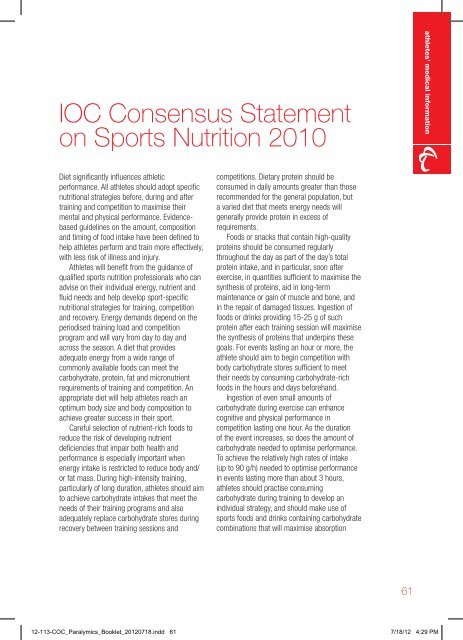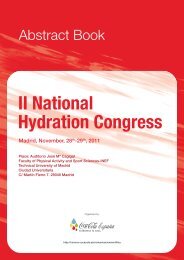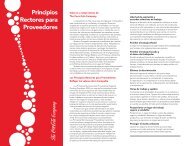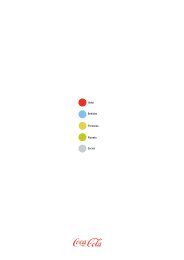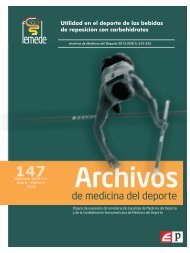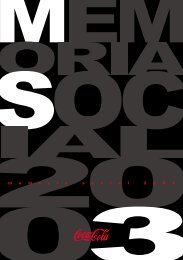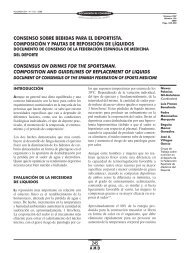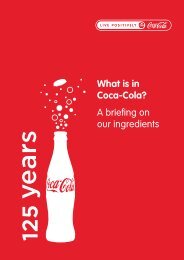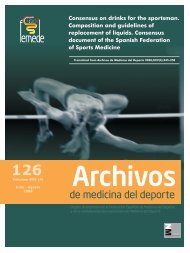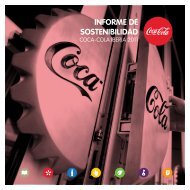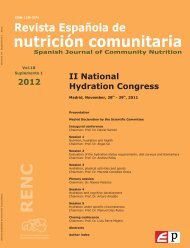athletes' medical information - Coca-Cola
athletes' medical information - Coca-Cola
athletes' medical information - Coca-Cola
You also want an ePaper? Increase the reach of your titles
YUMPU automatically turns print PDFs into web optimized ePapers that Google loves.
IOC Consensus Statement<br />
on Sports Nutrition 2010<br />
athletes’ <strong>medical</strong> <strong>information</strong><br />
Diet significantly influences athletic<br />
performance. All athletes should adopt specific<br />
nutritional strategies before, during and after<br />
training and competition to maximise their<br />
mental and physical performance. Evidencebased<br />
guidelines on the amount, composition<br />
and timing of food intake have been defined to<br />
help athletes perform and train more effectively,<br />
with less risk of illness and injury.<br />
Athletes will benefit from the guidance of<br />
qualified sports nutrition professionals who can<br />
advise on their individual energy, nutrient and<br />
fluid needs and help develop sport-specific<br />
nutritional strategies for training, competition<br />
and recovery. Energy demands depend on the<br />
periodised training load and competition<br />
program and will vary from day to day and<br />
across the season. A diet that provides<br />
adequate energy from a wide range of<br />
commonly available foods can meet the<br />
carbohydrate, protein, fat and micronutrient<br />
requirements of training and competition. An<br />
appropriate diet will help athletes reach an<br />
optimum body size and body composition to<br />
achieve greater success in their sport.<br />
Careful selection of nutrient-rich foods to<br />
reduce the risk of developing nutrient<br />
deficiencies that impair both health and<br />
performance is especially important when<br />
energy intake is restricted to reduce body and/<br />
or fat mass. During high-intensity training,<br />
particularly of long duration, athletes should aim<br />
to achieve carbohydrate intakes that meet the<br />
needs of their training programs and also<br />
adequately replace carbohydrate stores during<br />
recovery between training sessions and<br />
competitions. Dietary protein should be<br />
consumed in daily amounts greater than those<br />
recommended for the general population, but<br />
a varied diet that meets energy needs will<br />
generally provide protein in excess of<br />
requirements.<br />
Foods or snacks that contain high-quality<br />
proteins should be consumed regularly<br />
throughout the day as part of the day’s total<br />
protein intake, and in particular, soon after<br />
exercise, in quantities sufficient to maximise the<br />
synthesis of proteins, aid in long-term<br />
maintenance or gain of muscle and bone, and<br />
in the repair of damaged tissues. Ingestion of<br />
foods or drinks providing 15-25 g of such<br />
protein after each training session will maximise<br />
the synthesis of proteins that underpins these<br />
goals. For events lasting an hour or more, the<br />
athlete should aim to begin competition with<br />
body carbohydrate stores sufficient to meet<br />
their needs by consuming carbohydrate-rich<br />
foods in the hours and days beforehand.<br />
Ingestion of even small amounts of<br />
carbohydrate during exercise can enhance<br />
cognitive and physical performance in<br />
competition lasting one hour. As the duration<br />
of the event increases, so does the amount of<br />
carbohydrate needed to optimise performance.<br />
To achieve the relatively high rates of intake<br />
(up to 90 g/h) needed to optimise performance<br />
in events lasting more than about 3 hours,<br />
athletes should practise consuming<br />
carbohydrate during training to develop an<br />
individual strategy, and should make use of<br />
sports foods and drinks containing carbohydrate<br />
combinations that will maximise absorption<br />
61<br />
12-113-COC_Paralymics_Booklet_20120718.indd 61<br />
7/18/12 4:29 PM


